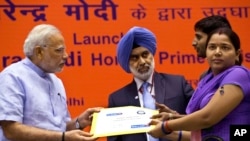India has rolled out a massive project to give a bank account to every household in the country. The ambitious endeavor for financial inclusion aims to draw millions of poor people into a modern economy and reduce their dependence on money lenders.
Hours before Prime Minister Narendra Modi formally launched the Project for People’s Wealth (Jan Dhan project) in New Delhi, banks enrolled about 15 million new account holders at thousands of camps held across the country.
Modi called it a campaign against “financial untouchability.”
He questioned how India could succeed in its battle against poverty if 40 percent of the country remains cut off from banking services. He said we must win freedom from “financial untouchability” by integrating all Indians into the economic system.
The prime minister said it is ironic that a poor person pays huge rates of interest to borrow money from moneylenders while the rich can raise loans at lower rates of interest from banks.
Under the program, each new account holder gets a debit card, accident insurance coverage up to $1,600 and overdraft protection to about $80.
The landmark initiative aims to bring 70 million households, who have no bank accounts, financial services by January.
Commerce Minister Nirmala Sitharaman said this will transform the lives of many people.
“I am sure the Pradhan Mantri Jan Dhan Yojana [Prime Minister Project for People’s Wealth] will touch the lives of everyone in a constructive and comprehensive way," said Sitharaman.
There are several reasons why so many Indians remain outside the banking system. Many poor people are unable to pay the $16 dollars most banks require as a minimum deposit. Millions of migrants to urban areas do not have identity papers needed to open an account. Vast swathes of the countryside are not covered by banking services.
Banks are promising to address the problems by branching out into rural areas and reducing the emphasis on formal documentation required for opening a new account.
Economists say financial inclusion is important for India’s transformation into a modern economy. It could ensure that more household savings enter the formal financial system - at the moment about one third of savings are channeled into gold jewelry or bars, especially in rural areas with poor banking services.
The project could also cut graft by making it possible to pay welfare benefits such as food and fuel subsidies directly into bank accounts.
Most importantly, it could reduce the dependency of poor households on moneylenders who offer loans at crippling interest rates.
The drive for financial inclusion is not new. Previous governments have attempted it, but made little progress. It remains to be seen how the latest drive will fare.
Director of the Centre of Equity Studies in New Delhi, Harsh Mander, says lack of banks in rural areas has been a great stumbling block and could still pose a hurdle.
“Banks very often find this a burden and financially unviable, so they do this very reluctantly, they make people come multiple times," said Mander. "100 percent financial inclusion should be a goal we set out, but we first need to create an infrastructure which ensures that there is a financial institution within three kilometers away of every habitation before this even becomes a feasible idea.”
Prime Minister Modi, who announced the program for financial inclusion in a nationwide Independence Day address two weeks ago, has made it an important goal for his government.
Observers say the program’s implementation could test his reputation as a man who can deliver results.
India Rolls Out Bank Accounts for All

NEW DELHI —



